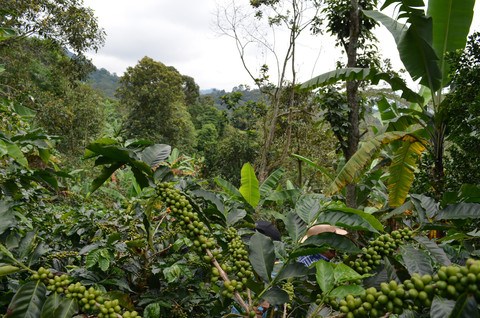The "sweet and sour" flavor of Kunjin coffee from Wahgi Valley WikiValley, Papua New Guinea.

Professional barista communication, please pay attention to coffee workshop (Weixin Official Accounts cafe_style)
Flavor Introduction
Want to feel coffee liquid entrance "sweet and sour shock" first choice_"like syrup sweet, with cherry, raisin, chocolate flavor, taste thick and full of fruit acid flavor."
Papua New Guinea & Kunjin
This coffee is the most unique Papua New Guinea coffee currently on the market. Kunjin is a centralised farm that specializes in buying coffee fruit from small coffee farmers in the highlands. Through a unified green bean processing and drying process, the processing plant is able to control the quality of the green beans during processing-daily batches are cup-tested and divided to select the few batches that traders want to buy, and then processed independently.
Papua New Guinea is a diverse country with more than 800 languages spoken. Most of Papua New Guinea's highland tribes had no contact with the West until the 1930s, when knowledge of Papua New Guinea was limited. Now Papua New Guinea is caught between Western cultural influences and local traditions.

Commercial coffee production began in Papua New Guinea in the 1920s with the introduction of the Jamaica Tibica variety Blue Mountain Coffee. At this time, most coffee was grown on 18 large farms. There are still large plantations in Papua New Guinea, but they account for only 15% of coffee production; most coffee production now comes from small-scale coffee farmers who grow coffee on small farms known locally as coffee gardens. A small-scale coffee farmer is a full-time farmer (farming for a living), but the crop they grow contains coffee, and there is no concept of a full-time coffee farmer locally. In each garden (farm), there may be only a few coffee trees, there may be hundreds, and each coffee farmer sends 25- 65 kg of coffee to the processing plant.
Kunjin coffee comes from small coffee farmers located at an altitude of 1,400 - 1,800 meters in the Wahgi Valley of the Western Highlands, not far from the big city of Mount Hagen. The green beans are processed at a leased John Gordon old washing plant located on a large farm. Owning a treatment plant or building in Papua New Guinea can be risky. It takes years to build trust with local tribes. Even if both sides reach an agreement, there is still a risk that the cooperation will break down. After all, local tribes can change their minds at any time when they find it profitable to operate a treatment plant. Papua New Guinea remains attractive as a coffee-producing country because its culture and society are exotic to the outside world.

Coffee taste "sour shock" preferred-"as sweet as syrup, with cherry, raisin, chocolate flavor, taste thick and full of fruit acid flavor."
described
Papua New Guinea Wikipedia Kunjin washed beans
Origin: Papua New Guinea
Region: Western Highlands, Wiki Valley
Farm: Multiple small coffee farmers
Coffee varieties: Arusha, Blue Mountain, San Ramon
Altitude: 1400--1800 m
Green bean treatment method: washing and sending to central drying plant
Important Notice :
前街咖啡 FrontStreet Coffee has moved to new addredd:
FrontStreet Coffee Address: 315,Donghua East Road,GuangZhou
Tel:020 38364473
- Prev

North Sumatra Lake Toba Lindong Mantenin Sources and Flavors Description
Indonesia introduced Arabica coffee during the Dutch colonial period in the 18th century and began to grow it until modern times, when it became one of the world's top coffee producers, mainly producing on Sumatra, Java and Surawesi islands. The bean is named after the Batak people who grow coffee beans on Lake Toba in northern Sumatra, and is crowned Bl because of its blue-green appearance.
- Next

Maracadura Maracaturra Variety from El Naranjo Dipilto Orange Fruit Manor in Nicaragua
For the exchange of professional baristas, please pay attention to the coffee workshop (Wechat official account cafe_style) Maracaturra variety introduction Mara Kadura, or Maracatu variety, commonly known as elephant bean Maragogype and Caturra graft breeding, the particle size is similar to the elephant bean, up to 22 mesh; Maracaturra, Pacamara and elephant bean Ma
Related
- Detailed explanation of Jadeite planting Land in Panamanian Jadeite Manor introduction to the grading system of Jadeite competitive bidding, Red bid, Green bid and Rose Summer
- Story of Coffee planting in Brenka region of Costa Rica Stonehenge Manor anaerobic heavy honey treatment of flavor mouth
- What's on the barrel of Blue Mountain Coffee beans?
- Can American coffee also pull flowers? How to use hot American style to pull out a good-looking pattern?
- Can you make a cold extract with coffee beans? What is the right proportion for cold-extracted coffee formula?
- Indonesian PWN Gold Mandrine Coffee Origin Features Flavor How to Chong? Mandolin coffee is American.
- A brief introduction to the flavor characteristics of Brazilian yellow bourbon coffee beans
- What is the effect of different water quality on the flavor of cold-extracted coffee? What kind of water is best for brewing coffee?
- Why do you think of Rose Summer whenever you mention Panamanian coffee?
- Introduction to the characteristics of authentic blue mountain coffee bean producing areas? What is the CIB Coffee Authority in Jamaica?

